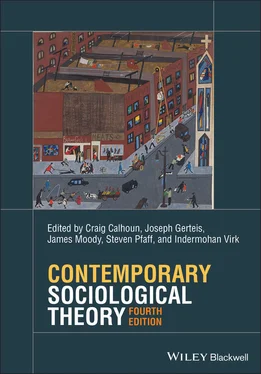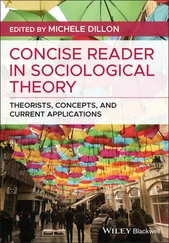1 ...6 7 8 10 11 12 ...48 Upward mobility is associated with societies in which there are many relatively permeable layers. Sociological theorists contrast such “stratification” systems with class inequality in which divides are sharper. Marx emphasized the categorical difference between owners of the means of production (capitalists) and workers who had no choice but to sell their labor. Class inequality remains a basic concern for sociological theory. It shapes every aspect of social structure.
In and after the 1960s, however, other dimensions of inequality demanded increased attention. Previous analyses of class have often emphasized the situation of white men, but race, ethnicity, and gender have also been basic dimensions of inequality. In each case, power has been mobilized to maintain inequality. And, there are other dimensions: sexual orientation, disability, and immigration status. In each case, contemporary sociological theorists are attentive not only to material inequality but also to issues of voice, cultural expression, and recognition of difference. They focus not only on the explicit exercise of interpersonal power but also on the ways in which culture and social structure distribute power unequally. Even a seemingly equal interaction between men and women or Black and White citizens is typically shaped by their previous experience of established inequalities and power dynamics. Likewise, unequal pay is not just a matter of pay for workers in exactly the same job but also cultural norms for workers in similar jobs. Women working as nurses and teachers are required to have high levels of education but are paid less than men in other occupations with similar requirements.
More generally, contemporary sociology has come to see inequality as a matter of cultural as well as economic capital and of the influence of each on the other. 9Inequalities are reproduced when parents are able to get their children better education than others. They are shaped by the neighborhoods in which families live. They are shaped by accents in people’s speech.
The most important theorist of the interrelationship of culture and inequality was Pierre Bourdieu (excerpted here). Bourdieu showed ways in which inequality was reproduced through a combination of culture, social structure, and individual internalization and the challenges of achieving agency for change. We do not just follow norms or rules, we develop habitual ways of acting. Bourdieu called this the “habitus.” But this is not just habit; it is also how we improvise new actions, even in new contexts, on the basis of our previous experiences. It is how a basketball player knows when to pass and how a stand-up comedian knows the timing crucial to a joke. 10
What becomes a part of us in this way is shaped by structural patterns in society, but not so much in the abstract as in the ways we encounter them. We internalize the class structure, for example, from the perspective of where we started out and a trajectory of how we did in school, job applications and promotions, treatment by other individuals – even dating! – and institutions like banks. Our experience of inequality is shaped not only by economic capital – money – but also by cultural capital.
After WWII, for example, there was a massive expansion of public schooling. Attendance through high school became almost universal. This was pursued as an extension of democratic rights and an attempt to create greater equality – and it did open up some opportunities. Bourdieu himself grew up poor, the grandson of a sharecropper and the son of a postman in a rural village in a disadvantaged region. He was able to attend elite schools and become a professor only because of government scholarships. However, Bourdieu pointed out, this was exceptional. Schooling was easily mobilized to reproduce inequality. Middle-class families could do more to prepare their children, and schools made their children feel more comfortable. The children of workers or peasants often felt out of place. Schools used tests to give an apparently objective measurement of performance, but children were not on a level playing field in the first place. And at every stage, there was sorting in which some children were destined for advancement. The “destiny” was not supernatural, however, not even natural. It was at least largely the product of different levels of investment in the children – by their parents, sometimes by teachers, by the state when they were sent to the “better” schools at higher levels and eventually to the top universities. The children of elites were inheritors of their parents’ advantages not just by means of direct financial transmission but by the indirect means of schooling. 11
Bourdieu was influenced by both Weber’s analysis of status hierarchies and Goffman’s account of the presentation of self in everyday life. He saw society as organized largely through making distinctions – from what food or music or art we like to what political candidates or potential romantic partners. 12In the abstract, these reflect cultural categories and their structured relations – the food is hot or mild and we label it with ethnic categories such as Mexican or Japanese; the music is raucous or mellow and we label it in genres such as rap or jazz. But each person develops tastes based on experience that is socially ordered, not random. And acting on tastes is always a kind of performance in relation to others. Showing what one likes, that one knows how to use chopsticks, or that one knows how to behave in a fancy restaurant or a loud club is also showing that one fits in to certain groups and sometimes showing off.
Seemingly individual tastes, thus, reproduce unequal social organization – elites are more likely to enjoy classical music or jazz and know how to behave in fancy restaurants; they are more likely to have higher education and lots of money. Everyone may want more money, but they do not necessarily want the tastes elites have, and they like the company of people who share their tastes. And, the formation and expression of tastes is shaped not only by hierarchy but also by oppositions: jazz is more popular among Black elites and those on the Left; classical music is more white and conservative.
Classifications are occasions for struggle, and what Bourdieu called “symbolic violence.” 13When women are told they are “naturally” more emotional and less rational, or when some forms of sex are said to be “unnatural,” this is symbolic violence. The politics of gender seeks to redefine how women are seen and thus what opportunities they have. Struggles for gay rights seek changes in both laws and attitudes that reflect negative classifications.
For Bourdieu, this social organization of tastes is part of a more general theory of inequality, power, and action. The different forms of capital are all distributed unequally: wealth, the cultural capital of prestige, the educational capital of credentials, the social capital of connections. They give people different chances in life as well as different tastes. Lack of capital brings suffering; greater capital confers power. In modern societies, power and capital are organized into fields linked to different kinds of institutions and production: business, government, law, education, health, religion, literature, and art. Each field has its own hierarchy, forms of capital, and characteristic habituses. As C. Wright Mills argued, branches of the power elite may all be connected, but each field is shaped by an interest in maintaining its autonomy. The government seeks not to be collapsed into business; business (or capitalism more generally) seeks not to be dominated by the government. All the cultural fields seek autonomy from both business and government. But, they also need support from markets or the state, so they have to manage these boundaries. And inside each field, there is opposition between those with more autonomy and those with less.
Читать дальше












